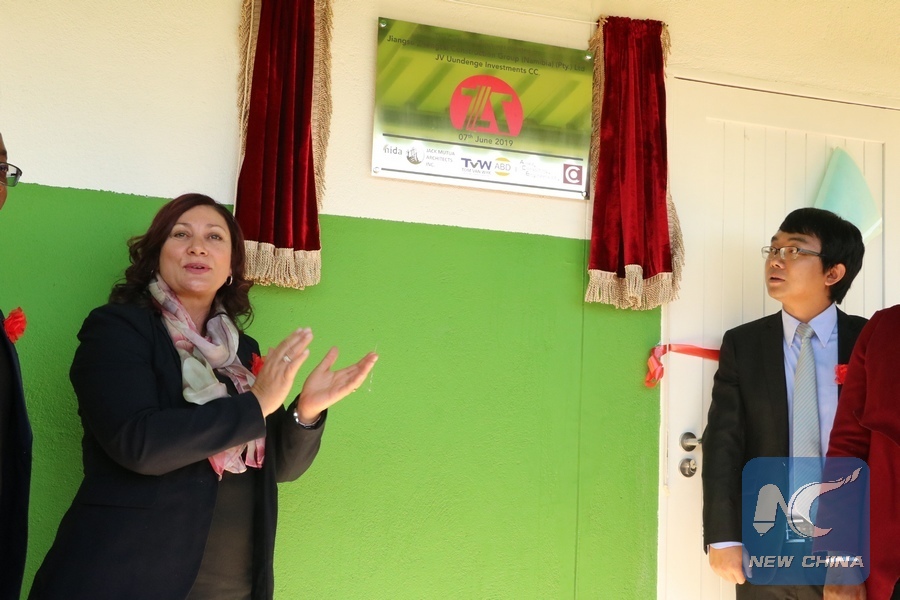
Stakeholders unveil a new classroom at Augeikhas Primary School in Windhoek, capital of Namibia, June 7, 2019. The school recently abolished the double-shift system practice following the inauguration of a block of three additional classrooms, constructed by Chinese Jiangsu Zhengtai Construction Company Group Joint Venture Uudenge Investment assisted by Jack Mutua Architects and consortium of engineers and surveyors. (Xinhua/Johanna Absalom)
WINDHOEK, June 12 (Xinhua) -- On a chilly Friday morning, Mee Shilongo escorted her eight-year-old daughter Kambushe Maria to Augeikhas primary school in Namibia's capital Windhoek.
"In the past, I left my daughter to walk alone because she attends afternoon classes as I had to go to work, which was risky. Now, however, I can walk her safely to school," Shilongo said.
It was a typical day of many parents whose children attended school in the afternoons of the double-shift system as the region battles with infrastructure shortage.
The school recently abolished the double-shift system practice following the inauguration of a block of three additional classrooms, constructed by Chinese Jiangsu Zhengtai Construction Company Group Joint Venture Uudenge Investment assisted by Jack Mutua Architects and consortium of engineers and surveyors.
Sanet Steenkamp, executive director in the Ministry of Education, Arts and Culture, said on Friday that although the double-shift system aided in meeting the high demand for education in the City, it, however, proved ineffective.
The double-shift system is a practice by which schools cater to another cohort of learners taught in the afternoons due to lack of adequate classrooms.
The school was entrenched in the dreaded double-shift system of teaching and learning since the 1970s.
According to Steenkamp, implementation of the double-shift system presented many challenges for the community and the school.
"It has negatively impacted on the morale and school culture. Learners were at risk in returning home late afternoons, separation of the school communities," she added.
Ding Wei from Jiangsu Zhengtai Construction Company Group said the aim is to contribute to national development by enhancing the provision of education in Namibia.

Stakeholders and local pupils pose for a group photo in a classroom at Augeikhas Primary School in Windhoek, capital of Namibia, June 7, 2019. (Xinhua/Johanna Absalom)
"We wish to meet the Namibian Government halfway in addressing challenges in education," Ding said.
Meanwhile, teachers at the school said the new classrooms would further spur integration and inclusion.
Sendy !Gontes, a grade-two teacher at the school, said that the abolishment of the double-shift system would reduce fatigue, improve the concertation span of learners, and boost academic progression.
"Learners walked when the sun at its peak, leading to fatigue and simultaneously negatively impacted academic performance," !Gontes added.
Meanwhile, according to Gerard Vries, the director of education in the Khomas region, the abolishment of the dreaded double-shift system will furthermore aid in improving the socio-economic orientation of community members.
"For instance, parents will be able to go to work without worrying about how their children will go to school and keep their jobs," Vries said.
In the interim, Julia Kandele, school principal of Augeikhas primary school, said the donation demonstrates friendly people-to-people relations between China and Namibia.

